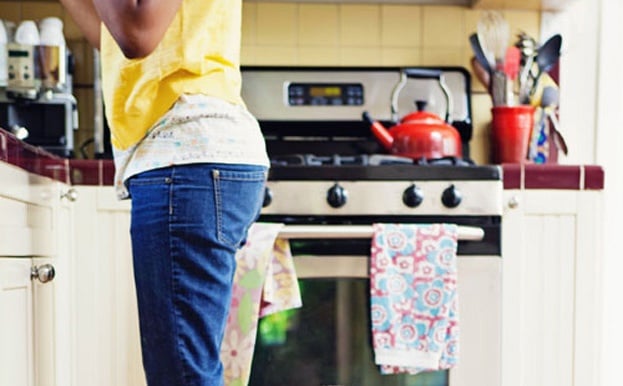
Cooking
- When the water has boiled, turn the heat down as low as possible so the water just keeps boiling. Do not cook food with the controls set higher than absolutely necessary.
- Putting a lid on a pot of water will help it to reach boiling point quicker.
- Do not cook food for longer than necessary.
- Keep the oven door completely closed until food is cooked (use the oven light to check food instead). Every time the door is opened, the oven temperature drops, and the heat must be replaced.
- It is cheaper to heat water in a kettle than to heat it in a pot on the stove.
- Only boil enough water needed for your coffee or food – more water means more electricity.Store excess hot water from the kettle in a vacuum flask for the odd cup of coffee or for washing up later.
- Make sure that the bottom of the pots are flat so that good contact can be obtained between the stove plates and the bottom of the pots.
- For stoves with the heavy solid plates which retain their heat, switch off the plate a few minutes before removing the pot.
- Small pots should be heated on the stove's small plates to avoid unnecessary heat loss.
- A microwave oven is cheaper to operate than a stove.
- A gas hob is cheaper to use than an electrical one.
- Use a Hot Box: it is an insulated container in which you place a cooking pot. The box keeps the food hot and cooking, without using any energy.
Fridges and freezers
- When a fridge door is open, warm air enters and it takes extra electricity for the appliance to cool it down again. So open the refrigerator or deep freeze door as little and for as short a period as possible.
- Do not place hot food in the refrigerator or deep freeze. Allow it to cool externally first.
- Ensure that door seals are in good condition.
- Defrost food in the fridge instead of the microwave oven as it is more economical.
- Thick frost on chilling panels reduces a fridge and freezer’s cooling ability. If you do not have a frost-free model, defrost your fridge or freezer when frost is between 0.6 cm and 1.3 cm thick.
- Empty, switch off and clean your fridge before going on a long holiday.
- An empty fridge means there's more air circulating that needs to be chilled. Fill up an empty fridge with water bottles.
Dishes
- Only switch on the dishwasher when it's full.
- Use the most eco-friendly setting. Washing dishes on a shorter, lower temperature (55°C) cycle is still hygienic and saves electricity.
- Switch off the dishwasher when it's in the drying cycle, just before the end, and open the door so the dishes can air dry. Steam uses most electricity.
- When handwashing in the sink, don't wash or rinse under running water, but always run a basin.
- Do not wash one cup at a time under the hot tap but rather stack the dirty dishes and wash them together in the sink at the same time.
Sources: http://www.capetown.gov.za, PowerAlert




 Publications
Publications
 Partners
Partners














